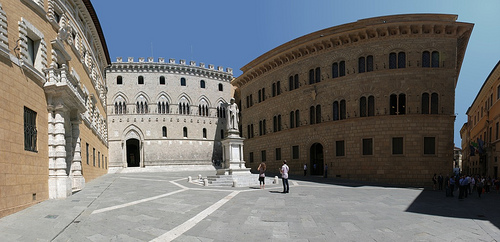
The solvency of Monte dei Paschi, the third-largest bank in Italy, loomed over the recent referendum on electoral reform in Italy that delivered a stunning blow to the EU political establishment, and effectively ended the government led by the then Prime Minister Mateo Renzi.
The solvency of Italy’s banks has been described as a ‘slow burn crisis’ and the ‘main source of concern for European financial regulators’. Italy is the euro zone’s fourth-largest banking sector, and the solvency of its banks has been a rolling crisis and a constant political irritant for several years. If Monte dei Paschi fails, the savings of many ordinary Italians will be threatened, which would add explosive fuel to the already brightly burning political fires in the lead up to a general election due in 2018, but which may now come sooner.
Since the referendum, JP Morgan has coordinated efforts to execute a private-sector bailout of Monte dei Paschi, which needed to raise €5 billion by the end of December to forestall action by EU regulators to wind down the bank, and the European Central Bank has refused to extend the current deadline for recapitalization because of liquidity fears. The rescue plan combined a share sale and a debt-for-equity swap, although it now seems the plan will fail after the largest potential anchor investor for the share sale, Qatar’s sovereign wealth fund, declined to participate, and without an anchor investor there is little appetite among other institutional investors for the shares.
With the imminent failure of the private rescue plan, the government lead by new Prime Minister Paolo Gentiloni is now expected to issue an emergency decree to save Monte dei Paschi by issuing €20 billion in public debt to fund bank bailouts, and effectively nationalizing Monte dei Paschi by lifting its stake from the current 4% to between 50% and 70%. However, the injection of new capital by the government will not of itself be sufficient, and a ‘bail-in’ by the bank’s retail bondholders will also be required, effectively exposing them to large losses. The funds of retail deposit holders are likely to be quarantined.
The political fallout from nationalizing Monte dei Paschi will be significant; the bank is unusual in that domestic retail investors hold most of the debt on the bank’s books that can be used as part of a ‘bail-in’, and the enforced burden sharing to save the bank will not be popular, particularly as the problems in Italy’s banking sector are not confined to Monte dei Paschi, and other banks are also likely to require state aid to remain viable. It is for this reason that the Italian Finance Minister, Pier Carlo Padoan, is out and about trying to reassure the country, saying that Italy’s banking system is ‘solid and healthy’, apart from some ‘critical’ situations. The effect is somewhat dampened when he also promises to ‘minimize, if not erase’ the impact of the public rescue on the savings of ordinary Italians, and the amount that the government is seeking to raise for bank bailouts is far more than that required to ensure the solvency of Monte dei Paschi, an implicit recognition that the problems are wider spread.
All of this assumes that the government-backed rescue of Monte dei Paschi is not opposed by Germany or the ECB; both have repeatedly said that insolvent banks in the euro zone should not be preserved by state- and taxpayer-funded intervention, and that bail-in packages are only to be used. The ECB, in anticipation of the growing crisis of solvency of banks in Greece, Italy, Spain and Portugal, is developing a ‘bail-in’ protocol for saving insolvent banks, and is therefore unlikely to allow Italy to take an inconsistent path to save Monte dei Paschi. If that occurs, a more extensive and painful bail-in is the only viable alternative to the complete failure of Monte dei Paschi, and the domestic political fall out will be explosive, particularly if the Euro-skeptic parties do well in the coming elections, and Italy holds a referendum on its participation in the common currency, or its membership of the EU.
Photo by asbruff 









